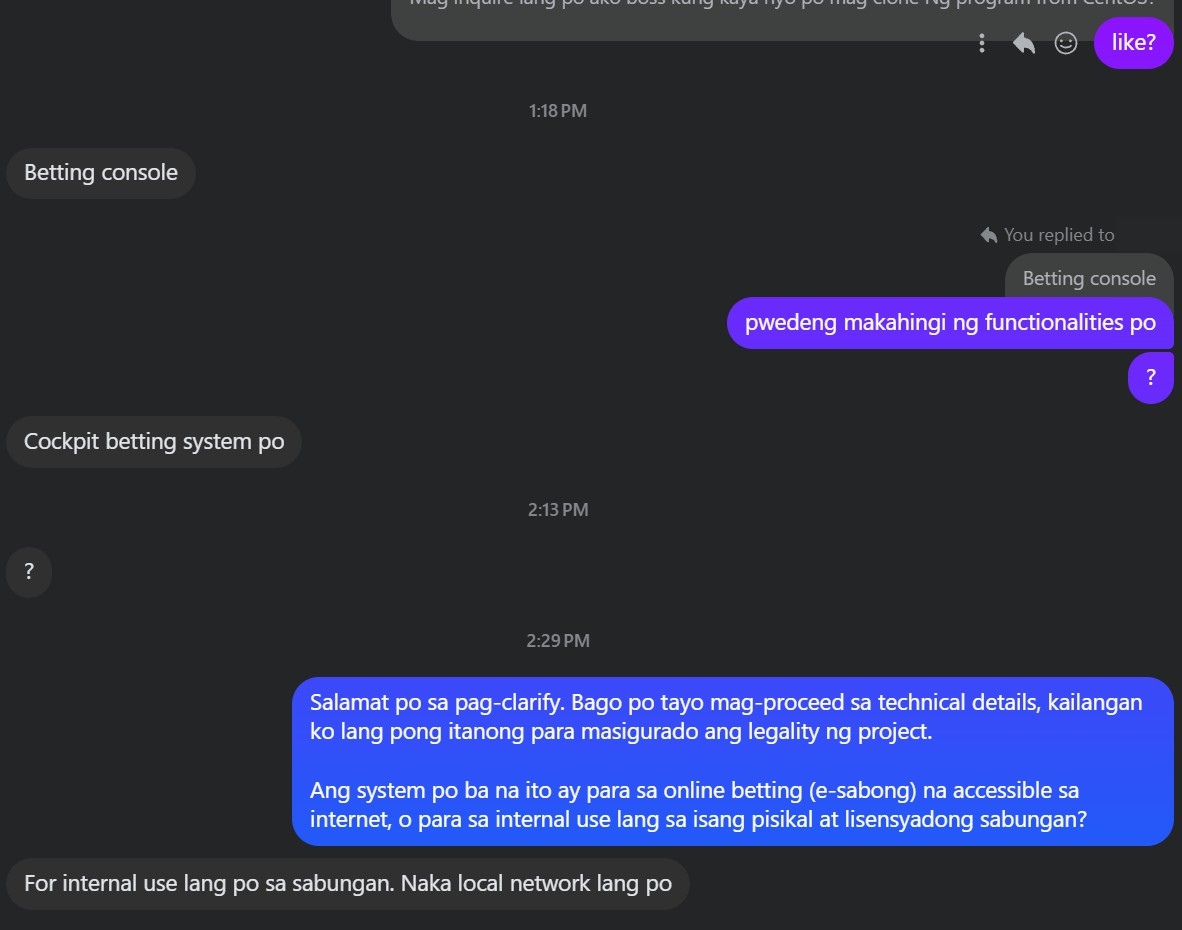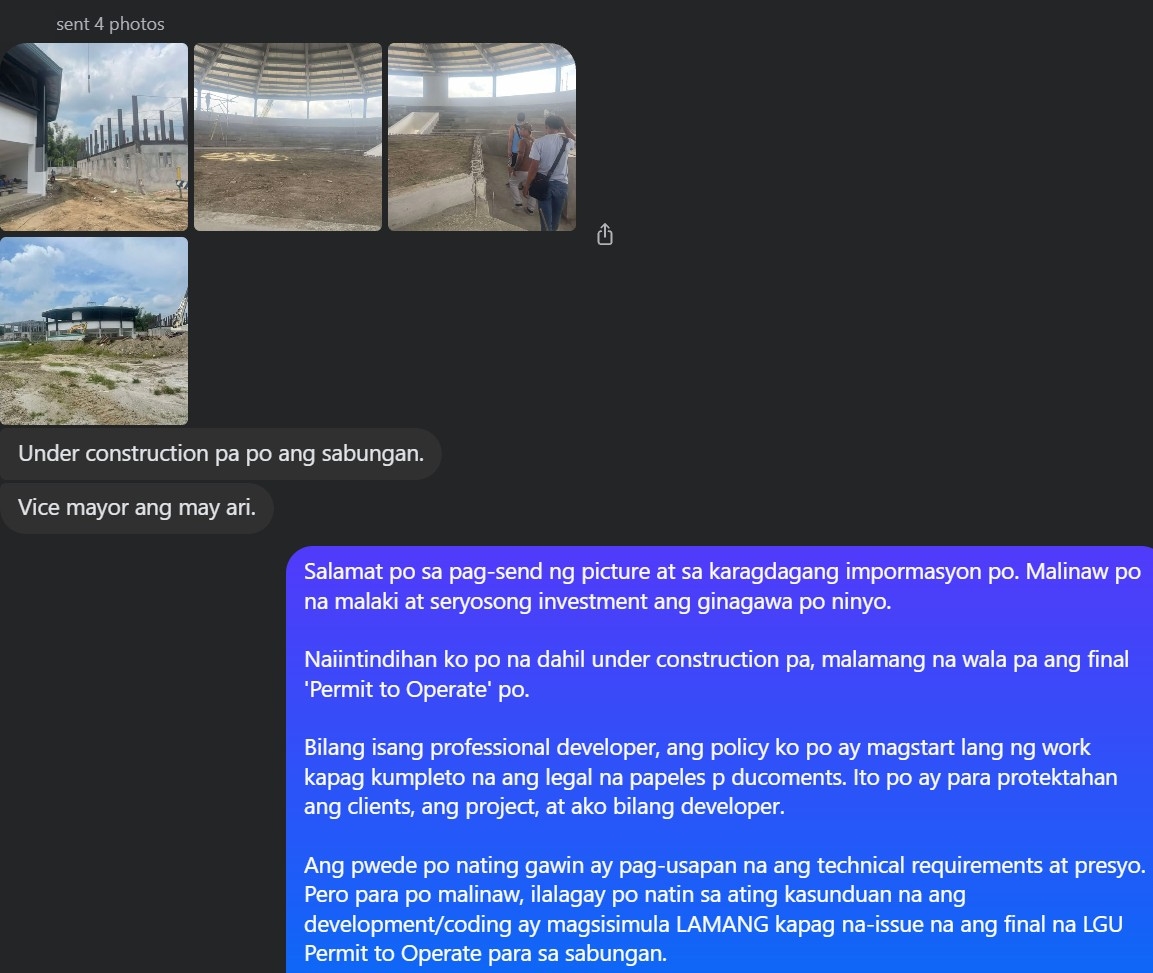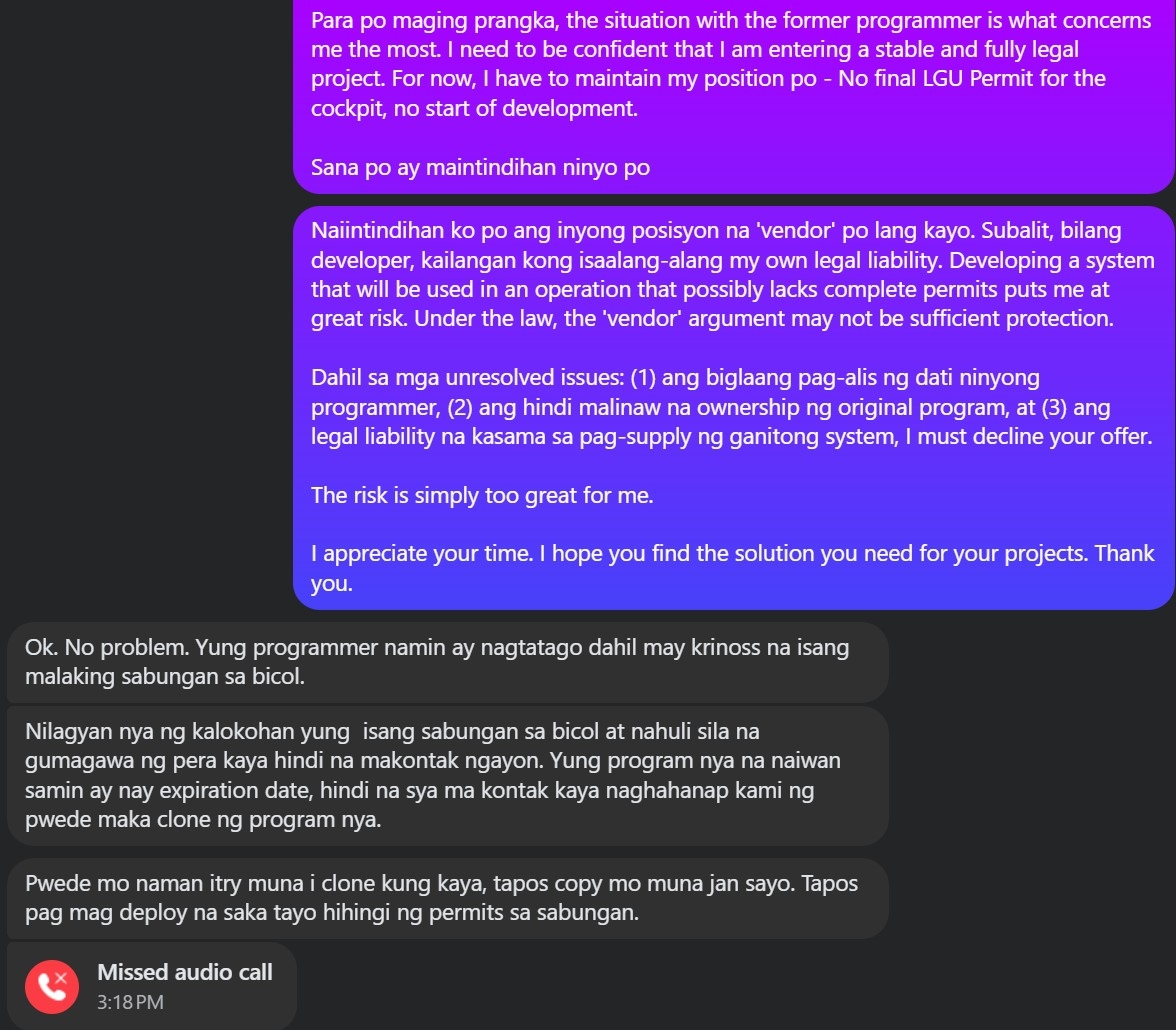Freelance Caution & Ethics
Anatomy of a Nightmare Client: A Freelancer's Case Study
Published on August 13, 2025 by Joselito Bacolod

Just a few days ago, may nag-pop up na message sa screen ko. It was the kind of inquiry every freelance developer dreams of. Malaki yung project, mukhang six-figures ang potential na bayad, at sa unang tingin, para siyang golden opportunity.
Ang request? To "clone" ang isang program—isang sophisticated na betting console para sa sabungan.
Shine-share ko 'tong kwento na 'to hindi para magyabang sa isang offer na tinanggihan ko, kundi bilang isang real-world case study sa pinaka-importanteng skill na pwedeng taglayin ng isang freelancer: knowing when to decline and walk away. This is the story of how a seemingly huge project turned out to be a one-way ticket to a legal, ethical, and dangerous disaster.
Yung initial request, simple lang naman. Isang potential client ang nangangailangan ng developer kasi yung dati nilang programmer, hindi na raw ma-contact. Ang sistema ay para sa isang "cockpit betting console."
Dito sa Pilipinas, immediate yellow flag na agad 'yan. While traditional sabong in licensed venues is part of the culture, its digital version, e-sabong, is illegal. Ang una kong obligasyon ay hindi magtanong tungkol sa tech stack o sa budget; I had to perform my due diligence.
My First Question:
"Is this system for online betting (e-sabong) accessible via the internet, or for internal use only in a single, physically licensed cockpit?"
Lesson #1: Your first question should be about legality, not technology. Bago ka pa magsulat ng kahit isang linya ng code, intindihin mo muna ang legal landscape ng client’s industry mo.
Red Flag #1
Sumagot yung client na for internal use lang daw sa local network. Good sign, 'di ba? Pero noong hiningan ko na ng mga kinakailangang LGU (Local Government Unit) permit para sa sabungan, dito na nagsimulang mag-iba ang kwento.
The Client's Evasive Reply:
"The cockpit is still under construction... The vice mayor is the owner."
Kasama nito ay mga litrato ng isang dambuhalang modernong arena na ginagawa pa lang. Hindi siya makapagbigay ng permit dahil hindi pa operational ang negosyo. Sa halip, inalok niya ang pangalan ng isang makapangyarihang politiko bilang assurance. To an experienced freelancer, this isn't reassuring; it's a giant red flag.

Lesson #2: Power and promises are not permits. Hindi ginagawang legal ng pangalan ng isang politiko ang isang proyekto. It just makes it riskier. Huwag na huwag magsimula ng trabaho dahil sa pangakong "kasunod na lang" ang mga legal na dokumento. Walang permit, walang code. Period.
Red Flag #2
As I continued to ask for legal assurances, the client revealed another bombshell.
The Second Bombshell:
"We are a system provider... our programmer can no longer be contacted. He just suddenly stopped replying."
This is a ghost story you don't want to be the main character in. Bakit aabandonahin ng isang developer ang isang malaking project? My suspicion was that he likely discovered the same risks I was uncovering.
Afterward, the client tried to distance himself from liability by saying, "They just buy the program and computers from us." This is a common but dangerous misconception. Knowingly providing the essential tools for an illegal or fraudulent activity does not make you an innocent vendor; it can make you an accomplice.
Lesson #3: You are responsible for the systems you build. Ang palusot na "vendor lang ako" ay hindi ka poprotektahan sa korte. And if a project's last developer vanished without a trace, you should be running in the opposite direction.
Inilatag ko lahat ng concerns ko at magalang na tumanggi sa project. I thought the conversation was over. But he replied one last time, and my caution was proven right in the most chilling way possible.
The Final, Horrifying Confession:
"Our programmer is in hiding because he double-crossed a big cockpit in Bicol. He put a fraudulent feature in the system... and they were caught stealing money, that's why he can't be contacted now. The program he left with us has an expiration date, and since he can't be contacted, we're looking for someone who can clone his program."

Let that sink in.
Hindi lang ito isang negosyong walang lisensya. Isa itong criminal enterprise na sangkot sa organisadong pandaraya. Ang dating developer ay hindi lang "nawala"—isa siyang pugante, nagtatago mula sa mga delikadong taong tinulungan niyang dayain. At hinihiling nila sa akin na maging kapalit niya. They needed me to help them continue their fraudulent operations.
The choice was never clearer. Hindi na ito tungkol sa pera. It was about my freedom, my safety, and my integrity as a professional. A six-figure salary is worthless if it comes at the cost of your peace of mind or, worse, lands you in a jail cell.
Hindi na ako nag-reply ulit. I blocked the contact and deleted the entire conversation.
We all get into freelancing to build a better life, to have freedom, and to create things we're proud of. There is more than enough clean, legal, and ethical work out there to build that life. You can earn a large income by helping a legitimate business grow, by building an app that solves a real problem, or by creating a beautiful website for a passionate client.
You don't need to earn it by helping someone steal, cheat, or break the law.
Choose your clients as carefully as you write your code. Your reputation, your safety, and your self-respect are the most valuable assets you have. Never trade them for any price.